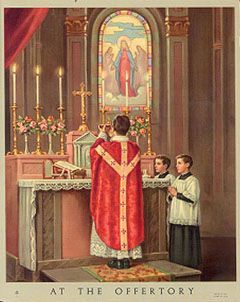After our preparatory prayers, the scripture readings, the sermon and the creed, we proceed to the offering of the sacrifice to the Father, the Offertory of the Mass.
The rites and prayers of this part of the Mass are concerned with preparing the sacrifice. In the Old Testament sacrifices, the animal or the loaves of other gifts had to be spotless, clean, and worthy to be offered. They were prepared for destruction or consumption in honour of almighty God.
Our sacrificial offerings on the other hand are to be changed. From bread and wine, they will become the body and blood of Our Lord Jesus Christ, given up on the cross for our salvation. Still, they are prepared with care. We try to keep everything spotless and clean and worthy for the sacred action.
This must also apply to ourselves. At the beginning of Mass, we have confessed our sins in general terms, and asked for God’s mercy. If we are guilty of serious sin, we must go to Confession before we can take a full part in the sacrifice by receiving Holy Communion.
Before concluding this part of the rite, the priest symbolically washes his hands – it is an ancient custom for him also to do this in the sacristy before he puts on the sacred vestments for Mass, and here at the offertory, it is a further ritual expression of our need for purity before God in view of the awesome act of sacrifice that is about to take place.
At the more solemn form of Mass (which is the “standard” form: the said or “Low” Mass is a cut-down form of the ritual) we honour both the sacrificial gifts and the altar itself with incense. We recall St Michael the Archangel, standing at the right of the altar of incense in heaven, and all the saints. When we celebrate the Holy Mass, we are one with the worship of heaven and adore the Father together with the angels and saints.
Having completed these prayers and actions, we are then ready to proclaim the praise and thanksgiving of the Father in the Preface before continuing with the prayer of consecration.
The first option for the prayers of the Offertory is for the priest to say them quietly, even at a said Mass. I always do this so as to leave to you the people of God the opportunity to make your own prayers at this point. You can, of course, follow the prayers of the Missal. But the priest says when he turns to you: “Pray brethren that my sacrifice and yours may be acceptable to God, the almighty Father.” We can, each of us, offer our own intentions at the Mass, asking the Father to accept our prayers together with the sacrifice that Our Lord offered for us.
At this point it is also appropriate to remember Our Blessed Lady. We are offering the bread and wine which will become the body and blood of Jesus Christ. Our Lady offered herself for the conception and birth of Jesus Christ. We could say that she made the greatest “offertory” of all, and she is intimately associated with us when we make our offerings at the Mass.
If we cannot for the moment think of a pressing intention that we need to present to the Father, let us leave it in her hands. She knows what is best for us, for our families and friends, for the Church and for the world. May she also assist us by her prayers to be suitably disposed for the great action in which we participate.

